Link outreach is the process of contacting other websites to ask for a backlink to your website.
For example, here’s an outreach email we sent as part of a broken link building campaign:
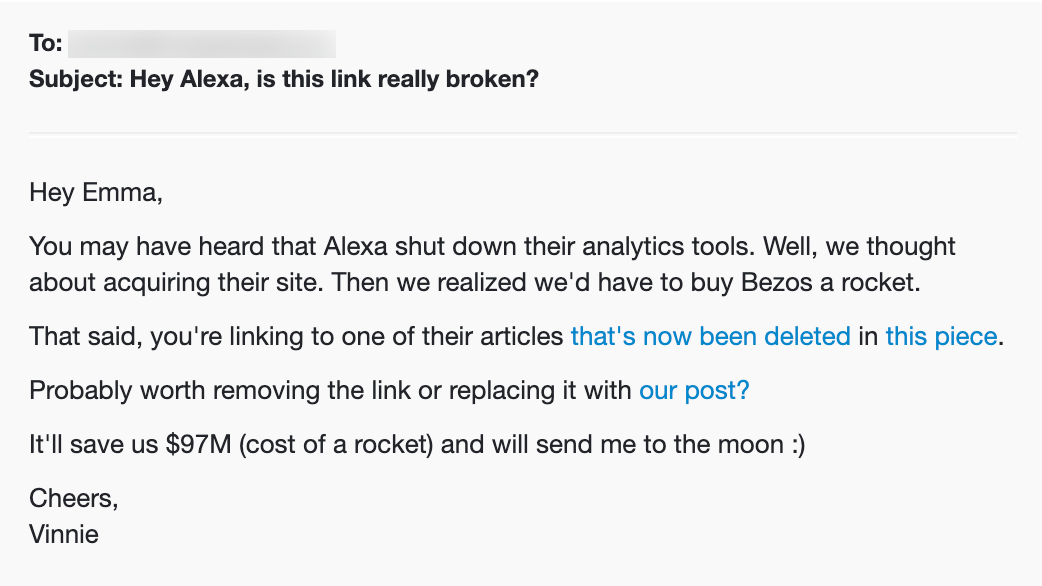
In this guide, you’ll learn how to get started with link outreach and how to get better results.
How to do link outreach
Link outreach is a four-step process:
1. Find prospects
No matter how amazing your email is, you won’t get responses if it’s not relevant to the person you’re contacting. This makes finding the right person to contact equally as important as crafting a great email.
Who to reach out to depends on your link building strategy. Here’s a table summarizing who you should find for the following link building tactics:
As a quick example, here’s how you would find sites likely to accept your guest posts:
- Go to Content Explorer
- Enter a related topic and change the dropdown to “In title”
- Filter for English results
- Filter for results with 500+ words
- Go to the “Websites” tab
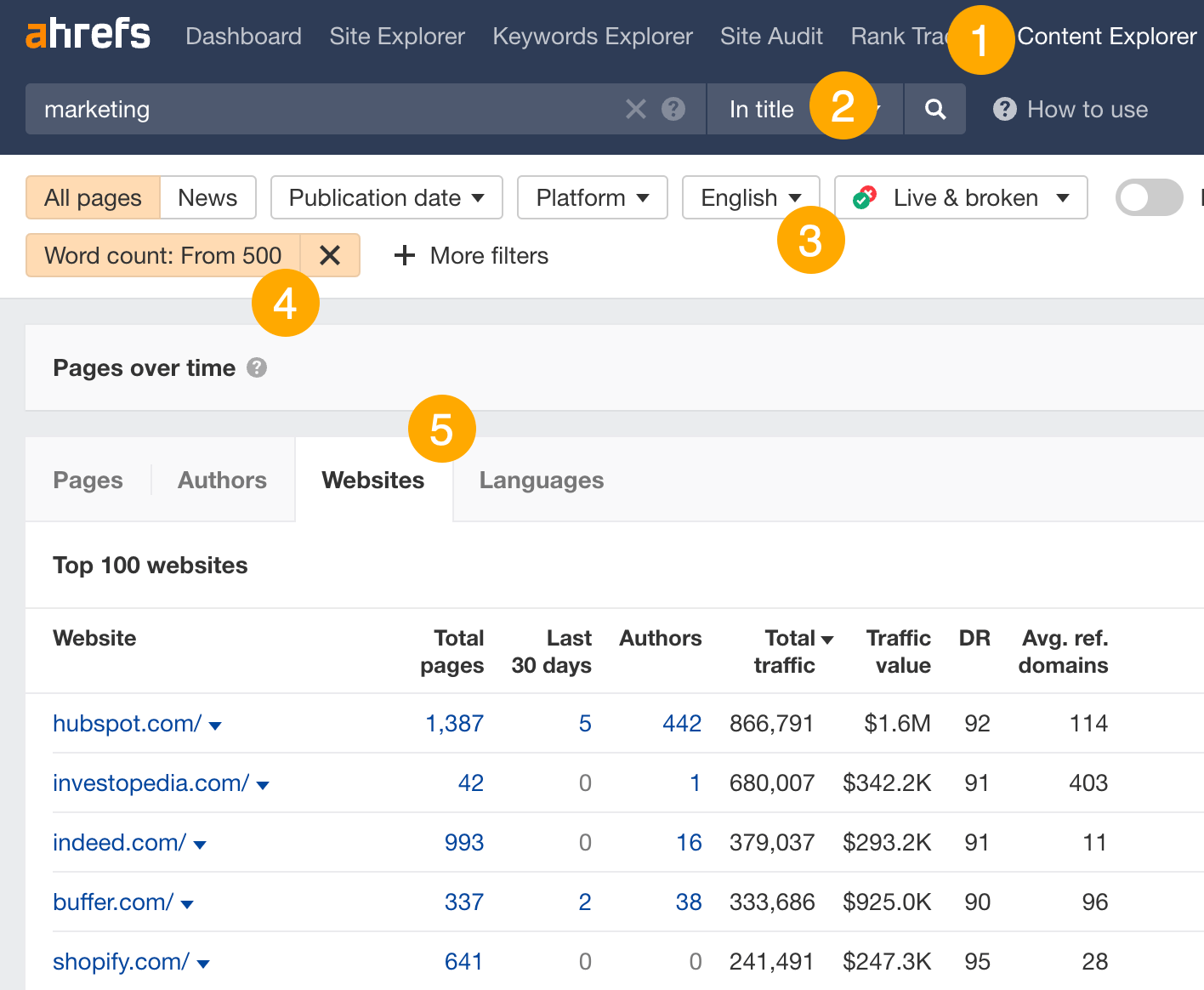
This shows you the websites getting the most search traffic to content about your target topic.
From here, you’d want to look at the Authors column to prioritize sites with multiple authors, as this suggests that they may accept guest posts.
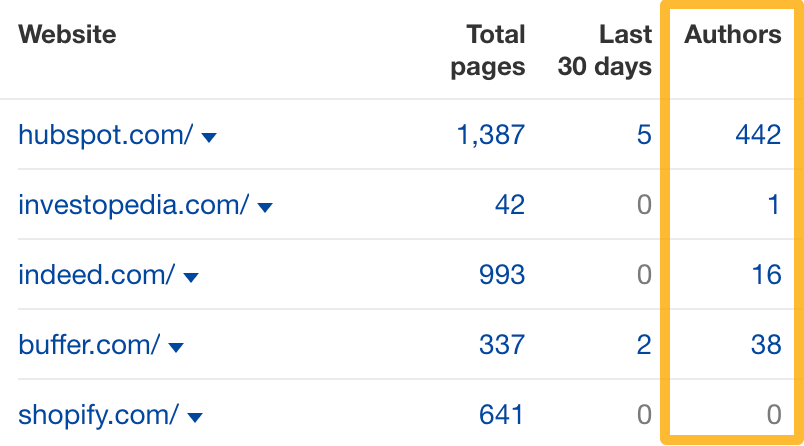
If you want to learn how to find prospects for different link building tactics, I recommend reading the resource below.
2. Find their contact details
Once you’ve curated a list of people to reach out to, you’ll need to find their contact information.
Typically, this is their email address. The easiest way to find this is to use an email lookup tool like Hunter.io. All you need to do is enter the first name, last name, and domain of your target prospect. Hunter will find their email for you:
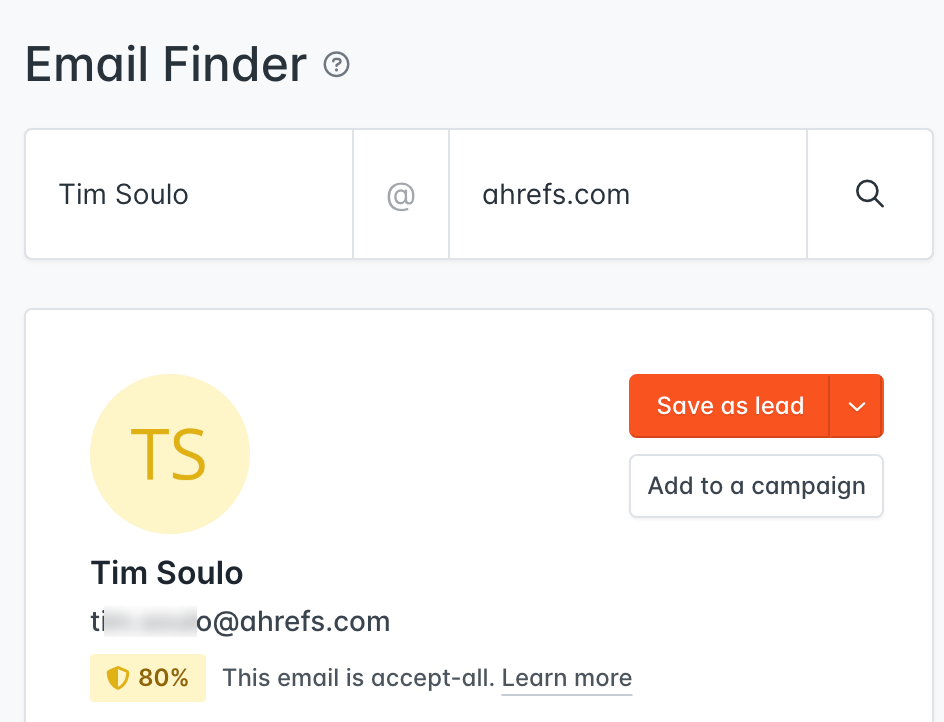
To prevent tearing your hair from searching for hundreds of emails one-by-one, most email lookup tools allow you to upload a CSV list of names and domains. Hunter also has a Google Sheets add-on to make this even easier.
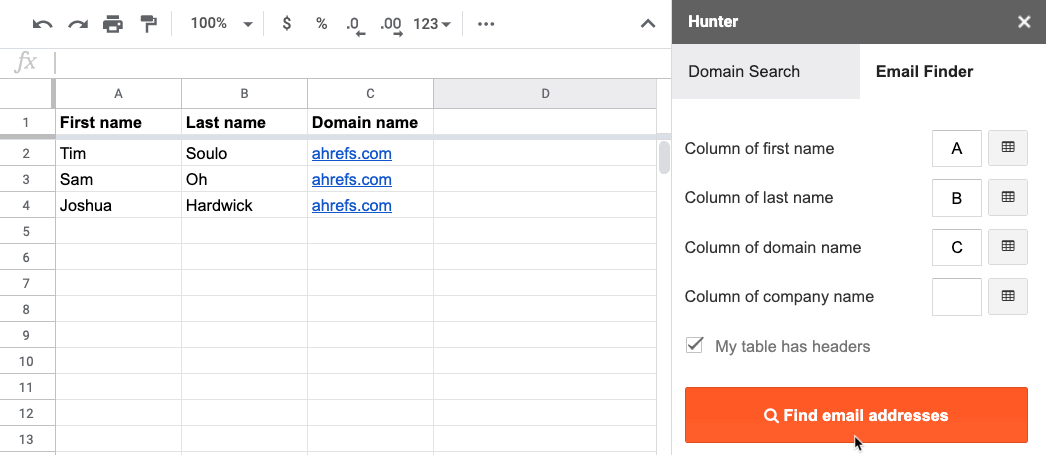
3. Send a personalized pitch
Knowing who to reach out to is half the battle won. The next ‘battle’ to win is actually getting the person to care.
Think about it. For someone to link to you, the following things need to happen:
- They must read your email
- They must be convinced to check out your content
- They must open the target page and complete all administrative tasks (log in to their CMS, find the link, etc.)
- They must link to you or swap out links
That’s a lot of steps. Most people don’t care enough to do this. That’s why there’s more to link outreach than just writing the perfect email (I’ll cover this in the next section).
For now, let’s look at how to craft an amazing email. To do that, you need to answer three questions:
- Why should they open your email? — The subject line needs to capture attention in a busy inbox.
- Why should they read your email? — The body needs to be short and hook the reader in.
- Why should they link to you? — Your pitch needs to be compelling: What’s in it for them and why is your content link-worthy?
For example, here’s how we wrote our outreach email based on the three questions:
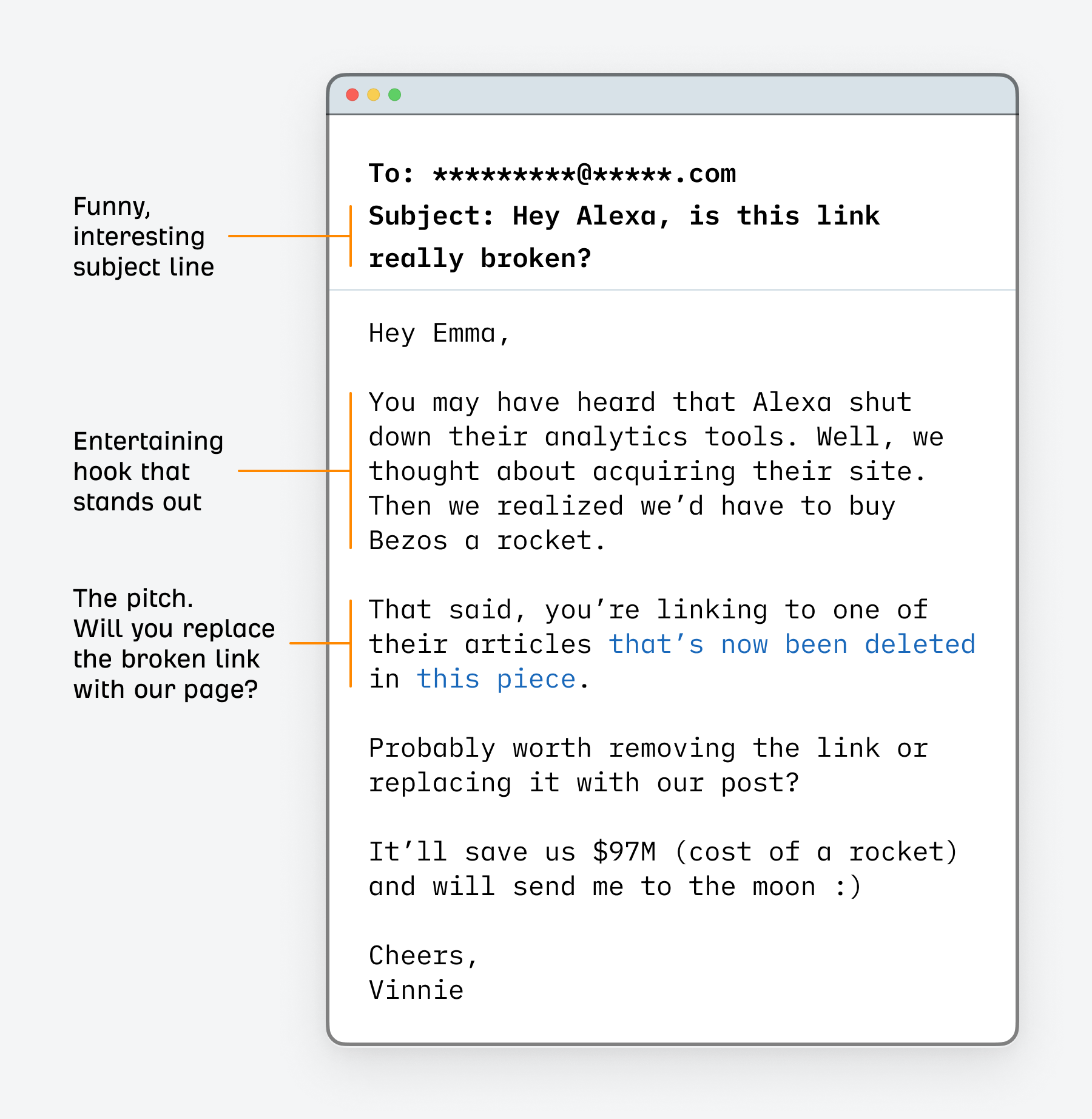
Here’s another outreach email we wrote, this time for a campaign building links to our content marketing statistics post:
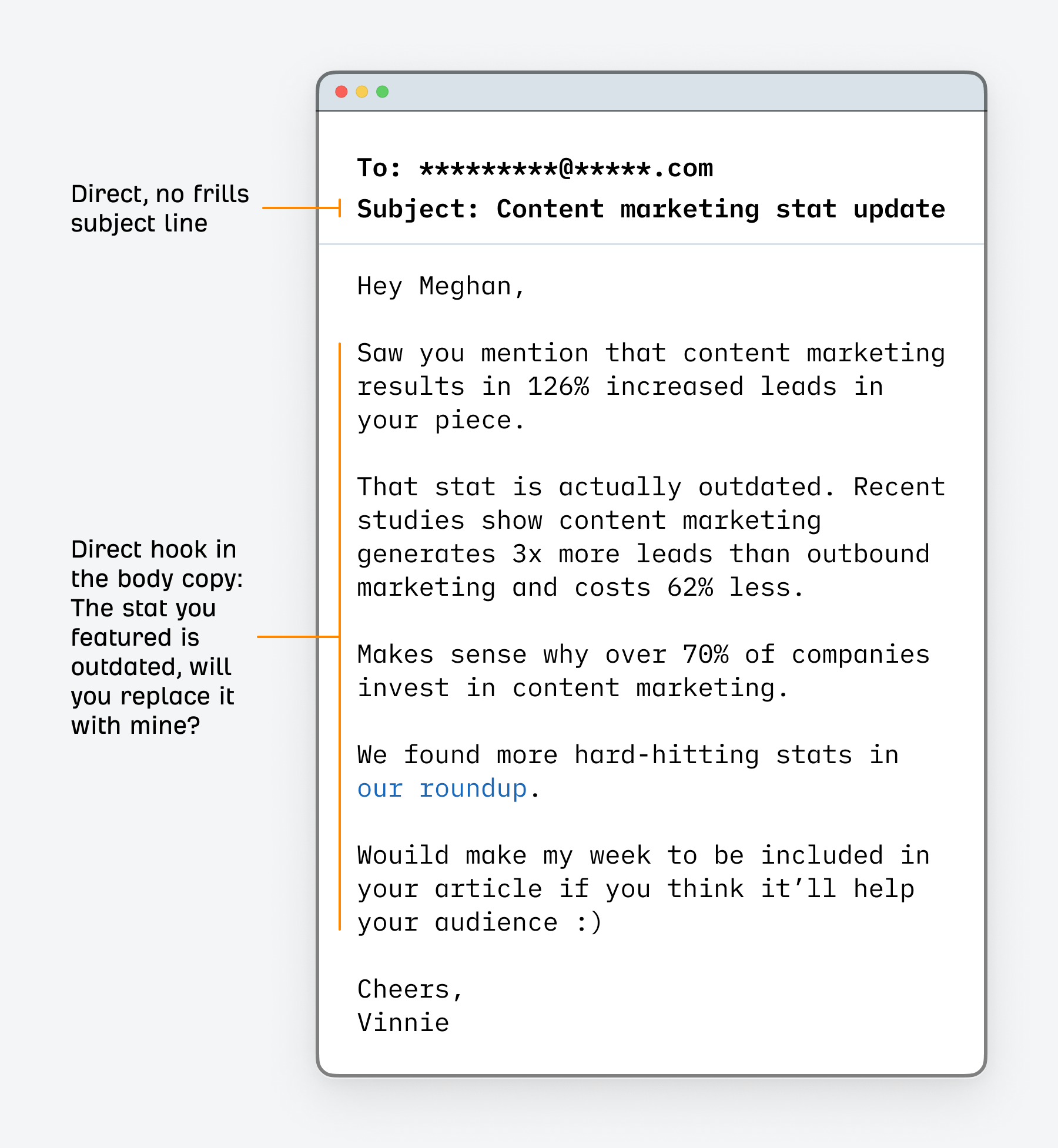
4. Follow up, once
People are busy and their inboxes are crowded. They might have missed your email or read it and forgot.
Solve this by sending a short polite follow-up.
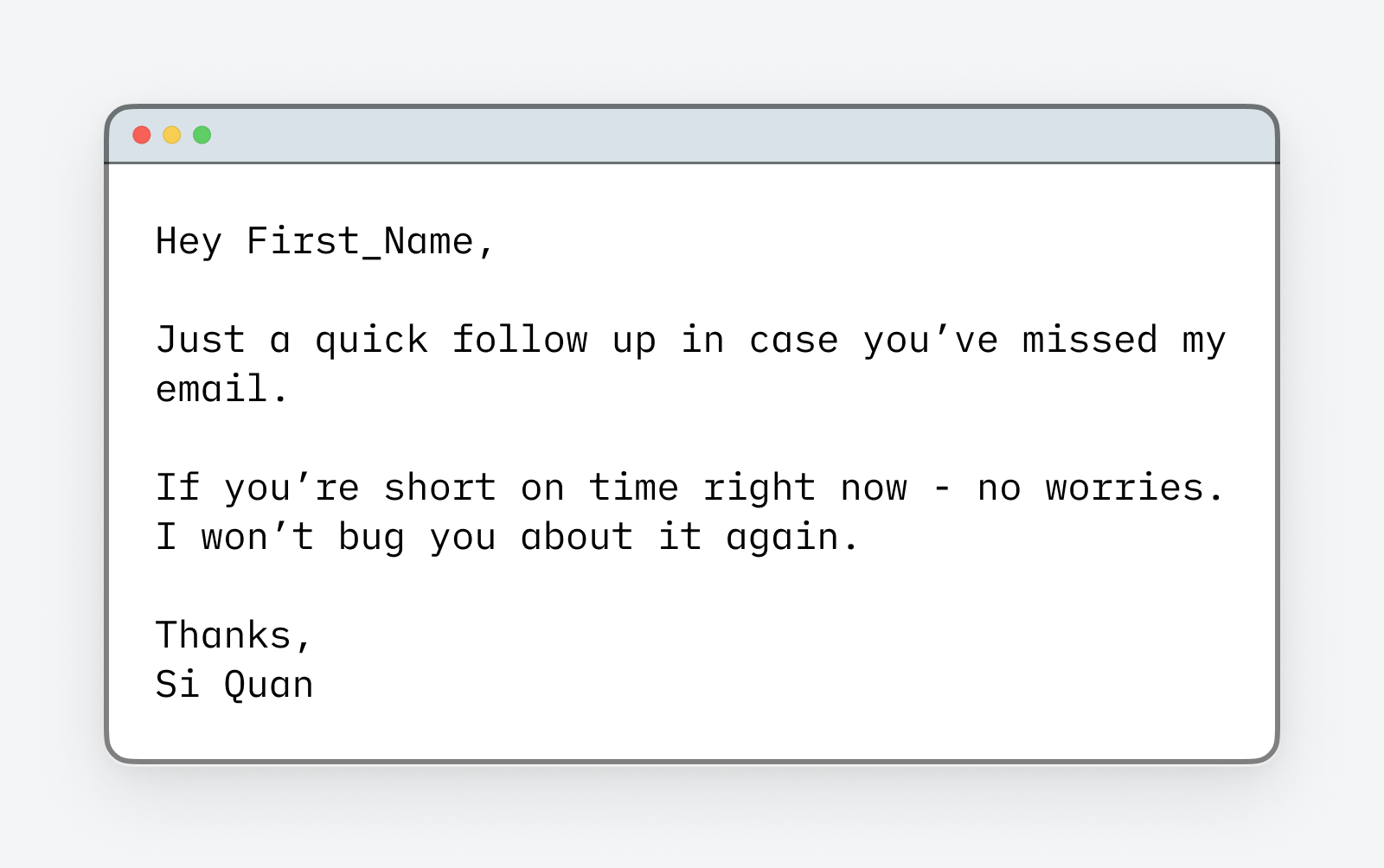
One is good enough. There’s no need to spam the other person with countless follow-up emails hoping for a different outcome. If they’re not interested, they’re not interested.
Link outreach tips
In theory, link outreach is simply finding the right person and asking them for a link. But there is more to it than that. I’ll explore some additional tips to help improve your outreach.
Don’t over-personalize
Some SEOs swear by the sniper approach to link outreach. That is: Each email is 100% customized to the person you are targeting.
But our experience taught us that over-personalization isn’t better. We ran link-building campaigns that sent hyper-personalized emails and got no results.
It makes logical sense: Most people just don’t do favors for strangers. I’m not saying it doesn’t happen—it does—but rarely will your amazing, hyper-personalized pitch change someone’s mind.
So, don’t spend all your time tweaking your email just to eke out minute gains.
Avoid common templates
My first reaction seeing this email is to delete it:
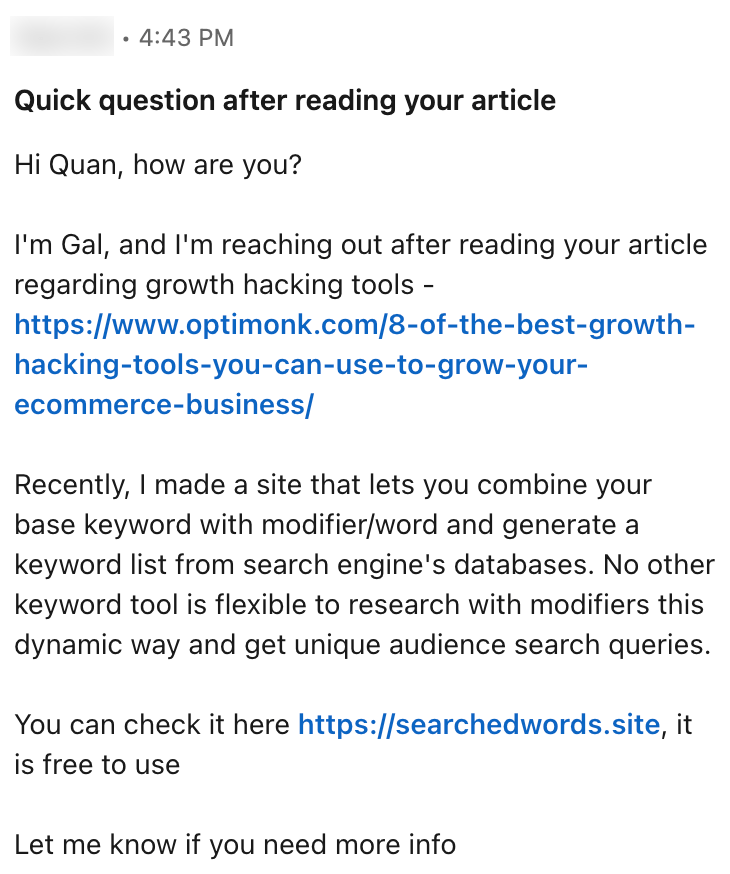
Why? Because it’s a template I’ve seen many times in my inbox. And so have many others.
Another reason: Not only did he reference a post I wrote six years ago, it was a guest post, i.e., I do not have control over the site. This shows why finding the right prospects is important. He even got my name wrong.
Templates do work, but bad ones don’t. You can’t expect to copy-paste one from a blog post and hope to achieve success.
A better approach is to use the scoped shotgun approach: use a template but with dynamic variables.
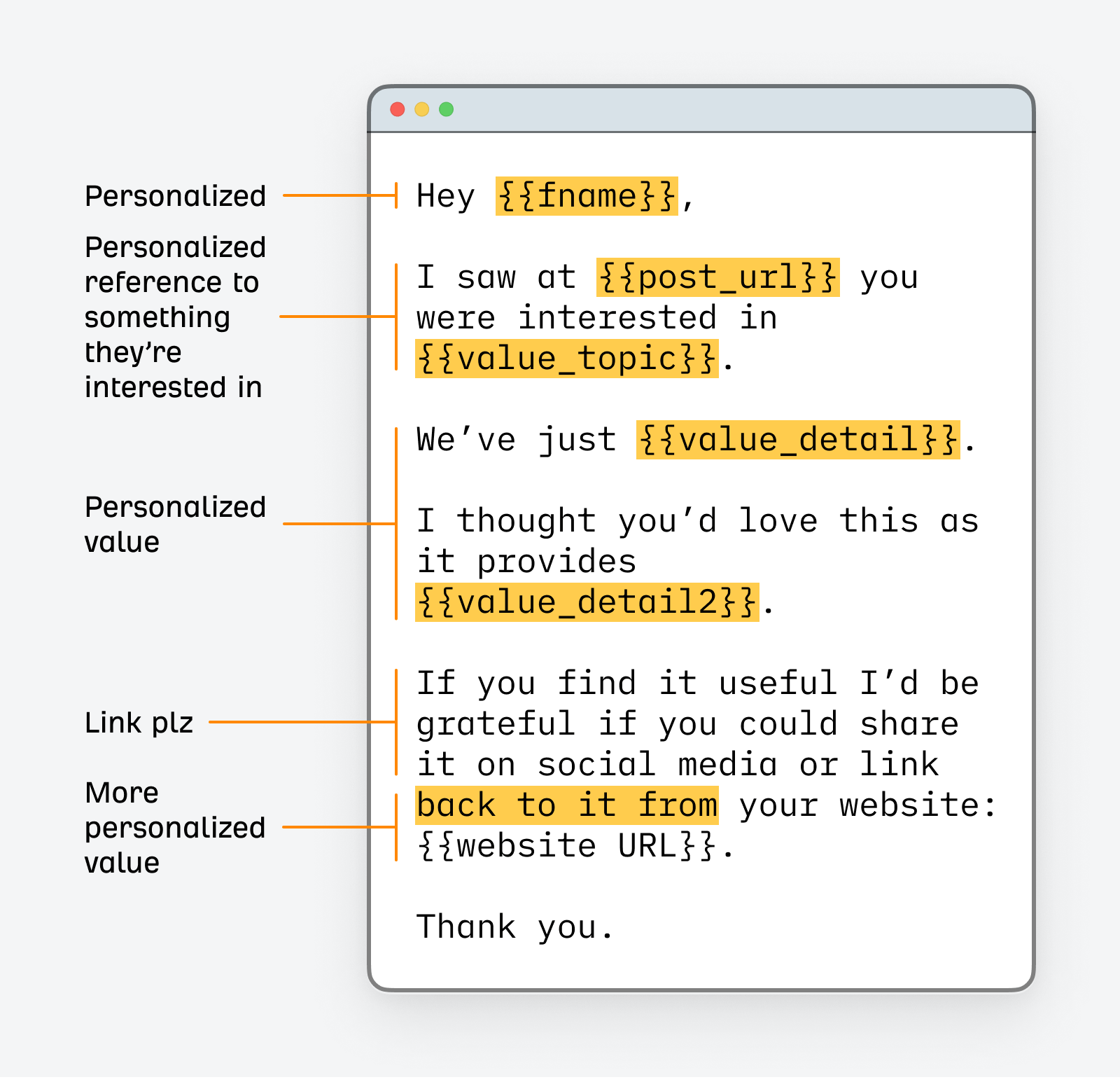
You can do this with tools like Pitchbox and Buzzstream.
This can help achieve a decent level of personalization so your email isn’t spammy. But it doesn’t spend all your time writing customized emails for every prospect.
Send lots of emails
When we polled 800+ people on X and LinkedIn about their link outreach results, the average conversion rate was only 1-5%.
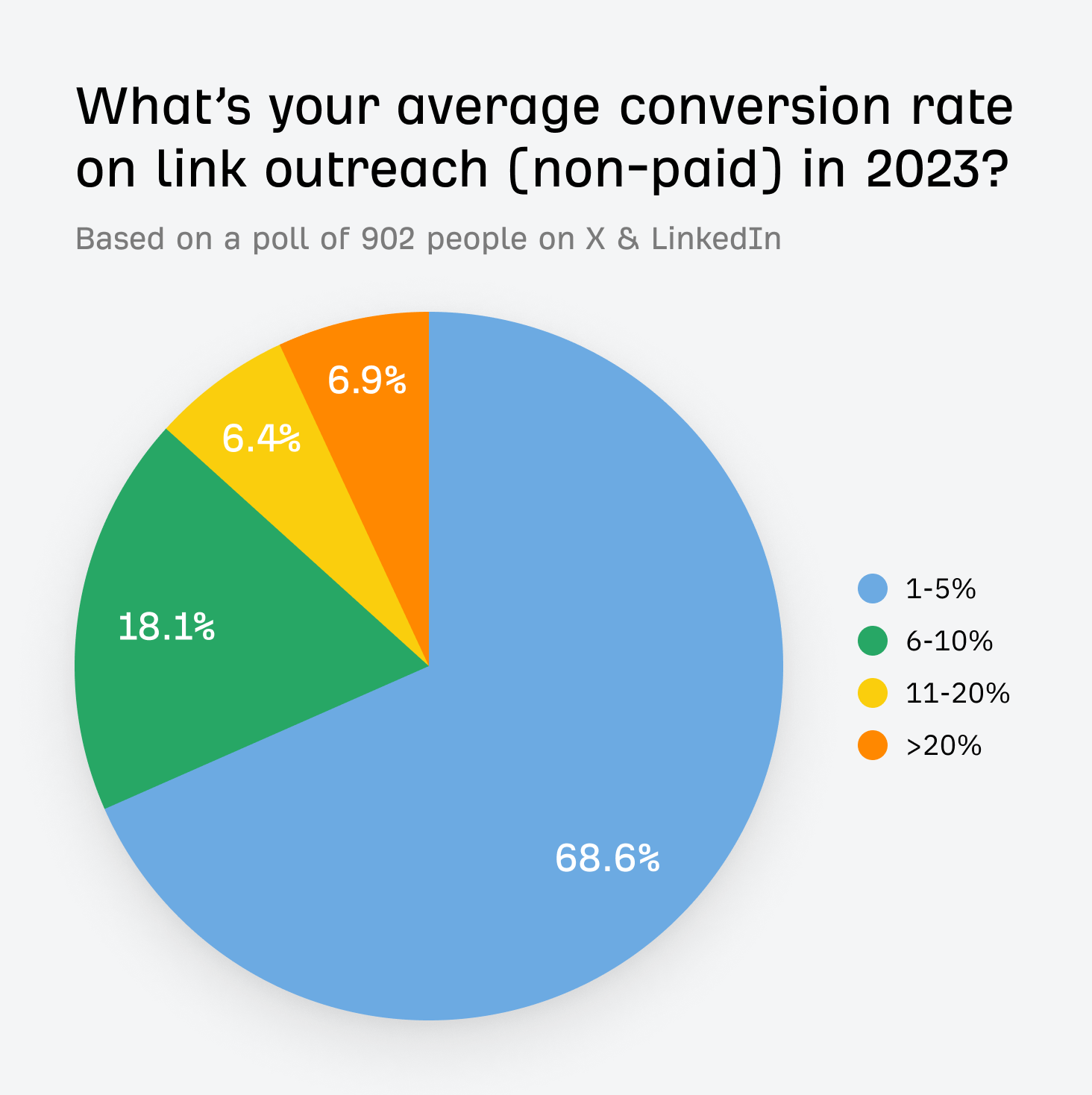
This is why you need to send more emails. If you run the numbers, it just makes sense:
- 100 outreach emails with a 1% success rate = 1 link
- 1,000 outreach emails with a 1% success rate = 10 links
I’m not saying to spam everyone. But if you want more high-quality links, you need to reach out to more high-quality prospects.
Build a brand
A few years ago, we published a link building case study:
- 515 outreach emails
- 17.55% reply rate
- 5.75% conversion rate
Pretty good results! Except the top comments were about how we only succeeded because of our brand:
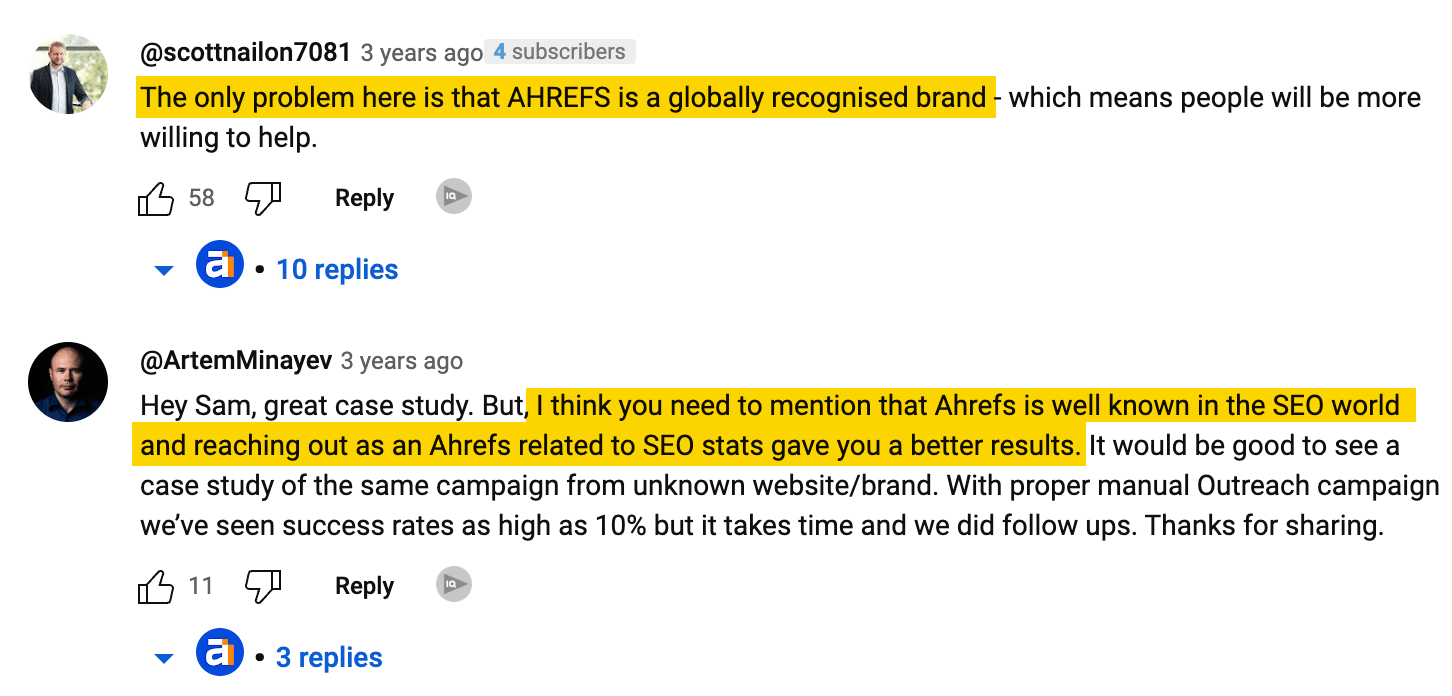
It’s true; we acknowledge it. But I think the takeaway here isn’t that we should repeat the experiment with an unknown website. The takeaway is that more SEOs should be focused on building a brand.
We’re all humans—we rely on heuristics to make judgments. In this case, it’s branding. If your brand is recognizable, it solves the “stranger” problem—people know you, like you, and are more likely to link.
The question then: How do you build a brand?
I’d like to quote our Chief Marketing Officer Tim Soulo here:
What is a strong brand if not a consistent output of high-quality work that people enjoy? Ahrefs’ content team has been publishing top-notch content for quite a few years on our blog and YouTube channel. Slowly but surely, we were able to reach tens of millions of people and instill the idea that “Ahrefs’ content = quality content”—which now clearly works to our advantage.
Ahrefs was once unknown, too. So, don’t be disheartened if no one is willing to link to you today. Rome wasn’t built in a day.
Trust the process and create incredible content. Show it to people. You’ll build your brand and reputation that way.
Build relationships with people in your industry
Outreach starts before you even ask for a link.
Think about it: People don’t do favors for strangers but they will for friends. If you want to build and maintain relationships in the industry, way before you start any link outreach campaigns.
Don’t just rely on emails either. Direct messages (DMs) on LinkedIn and X, phone calls—they all work. For example, Patrick Stox, our Product Advisor, used to have a list of contacts he regularly reached out to. He’d hop on calls and even send fruit baskets.
Create systems and automations
In its most fundamental form, link outreach is really about finding more people and sending more emails.
Doing this well is all about building systems and automations.
We have a few videos on how to build a team and a link-building system, so I recommend that you check them out.
Final thoughts
Good link outreach is indistinguishable from good business development.
In business development, your chances of success will increase if you:
- Pitch the right partners
- Have a strong brand
- Have prior relationships with them
- Pitch the right collaboration ideas
The same goes for link outreach. Follow the principles above and you will see more success for your link outreach campaigns.
Any questions or comments? Let me know on Twitter X.
Source link : Ahrefs.com

